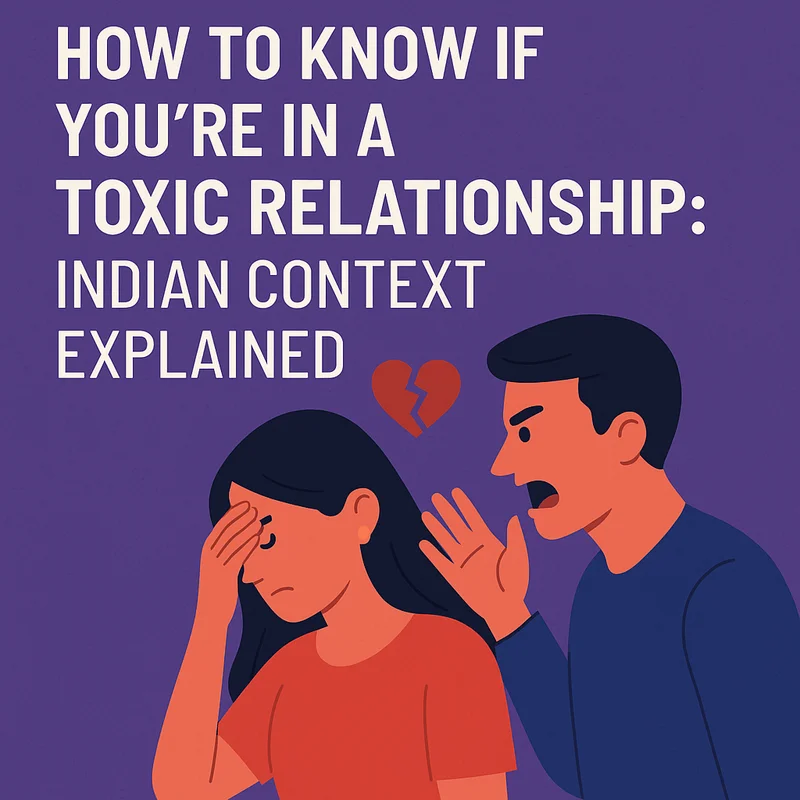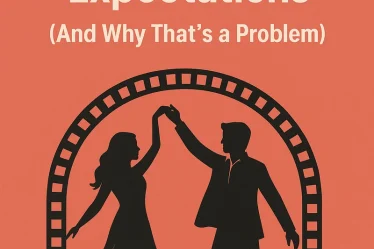
How to Know if You’re in a Toxic Relationship: Indian Context Explained
Introduction: Are You in a Toxic Relationship?
Sometimes, love isn’t enough. If you constantly feel emotionally drained, anxious, or unsure of your self-worth in your relationship, it might not be “just a rough patch.” It could be a toxic relationship.
While toxic behavior can exist in any relationship, the Indian context presents unique challenges that make it harder to identify or even accept that something is wrong. Cultural norms often blur the lines between “compromise” and emotional abuse.
This article will help you identify the signs of a toxic relationship, understand how Indian culture influences relationship dynamics, and offer advice on what to do next.
What Is a Toxic Relationship?
A toxic relationship is one where emotional, psychological, or even physical harm occurs frequently. These relationships lack mutual respect, support, and healthy communication.
According to psychologist Dr. Lillian Glass, a toxic relationship is “any relationship between people who don’t support each other, where there’s conflict, one seeks to undermine the other, where there’s competition, disrespect, and a lack of cohesiveness.”
🧠 Common traits of toxic relationships include:
- Constant manipulation or guilt-tripping
- Disrespect and dismissive behavior
- Lack of trust and honesty
- Emotional exhaustion and fear
10 Warning Signs You’re in a Toxic Relationship
Here are red flags that should never be ignored:
- Constant criticism and belittling
- Lack of trust and constant suspicion
- Extreme jealousy or possessiveness
- Controlling behavior – finances, friends, clothes
- Gaslighting – making you doubt your memory or feelings
- Silent treatment and stonewalling
- Disrespecting boundaries – physical or emotional
- Public shaming or humiliation
- Physical aggression – even a push or grab counts
- You feel emotionally and physically drained
If these signs feel familiar, it’s time to take a closer look at your relationship.
The Indian Context: Why Toxicity Often Gets Normalized
In India, the idea of staying in a relationship — especially a marriage — no matter what, is deeply ingrained. Many toxic behaviors are seen as “adjustments,” especially for women.
📌 Key cultural influences:
- Arranged marriages with family pressure to “make it work”
- The belief that “Shaadi ek samjhauta hai” (marriage is compromise)
- Lack of healthy relationship education
- Social stigma around divorce or separation
- Family honor (izzat) outweighing personal happiness
As a result, emotional abuse, control, and even manipulation often get swept under the rug as normal behavior.
Mental Health Effects of a Toxic Relationship
Being in a toxic relationship doesn’t just hurt your heart—it can seriously affect your mental and physical health.
🧠 Common effects include:
- Anxiety and depression
- Loss of confidence and self-worth
- Sleep issues, fatigue, and loss of appetite
- Chronic stress and trauma bonding
According to NIMHANS, emotional abuse in relationships can be just as damaging as physical violence, especially when prolonged.
Why People Stay in Toxic Relationships
It’s not always easy to walk away. In India, the emotional and societal barriers can be overwhelming.
💔 Common reasons include:
- Fear of being judged by family or society
- Financial dependency, especially for women
- Children and fear of breaking up the family
- Hope that the partner will change
- Deep emotional attachment and trauma bonding
Staying often feels easier than facing judgment and uncertainty.
How to Deal with a Toxic Relationship in India
If you suspect you’re in a toxic relationship, here are steps to help you cope and decide your next move:
✅ Start with self-awareness: Journal how the relationship makes you feel
✅ Talk to a trusted friend or therapist – don’t isolate yourself
✅ Set clear boundaries – and enforce them
✅ Reach out to professional support:
- Snehi (Delhi-based counseling service)
- iCall (TISS mental health helpline)
- Sakshi NGO (Domestic abuse support)
✅ If you decide to leave, plan safely: Have financial, emotional, and legal support in place
When to Walk Away
Sometimes, no matter how much you try, the relationship doesn’t get better. That’s when it’s time to walk away.
🛑 It’s time to leave if:
- You feel fear more than love
- Your boundaries are constantly violated
- Your self-esteem has been destroyed
- Your safety is at risk (emotionally or physically)
You deserve a life free from fear, pain, and emotional manipulation.
Healing After a Toxic Relationship
Recovery is possible—and essential. Once you leave, focus on rebuilding your life:
💗 Healing steps:
- Seek therapy to process the trauma
- Reconnect with friends, family, and yourself
- Rebuild your self-worth through affirmations and self-care
- Join a support group or community of survivors
- Learn to set healthy boundaries in future relationships
Healing takes time, but it’s the first step toward a healthier, happier life.
Conclusion: You Deserve a Healthy, Loving Relationship
Toxic relationships thrive in silence and denial. By recognizing the signs and understanding how culture plays a role, you can take control of your emotional well-being.
Don’t wait for things to get worse. Listen to your inner voice. You deserve peace, love, and a life that uplifts you—not one that breaks you down.
FAQs
Q1. What are the early signs of a toxic relationship?
Early signs include constant criticism, emotional manipulation, and feeling emotionally drained after every interaction.
Q2. Is it normal to feel unhappy in a relationship all the time?
No. While all relationships have ups and downs, persistent unhappiness is a sign of deeper issues that shouldn’t be ignored.
Q3. How do Indian cultural norms affect relationships?
Indian culture often encourages compromise and endurance in relationships, even when they are toxic, making it harder to recognize abuse.
Q4. Can therapy help in a toxic relationship?
Yes. Therapy can help you understand your situation clearly, build self-esteem, and explore healthy ways to cope or exit.
Q5. Where can I seek help if I feel stuck in a toxic relationship?
You can contact helplines like Snehi, Sakshi NGO, or iCall for mental health and relationship support in India.



